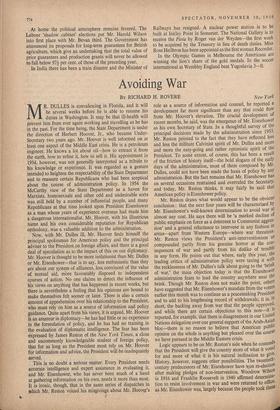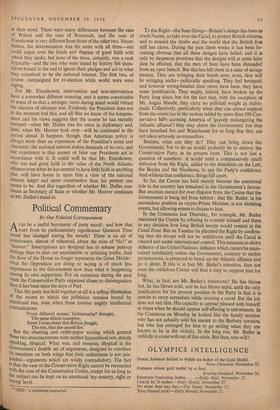Avoiding War
MR. DULLES is convalescing in Florida, and it will be several weeks before he is able to resume his duties in Washington. It may be that ill-health will prevent him from ever again working and travelling as he has in the past. For the time being, the State Department is under the direction of Herbert Hoover, Jr., who became Under- Secretary two years ago. Mr. Hoover is well informed on at least one aspect of the Middle East crisis. He is a petroleum engineer. He knows a lot about oil—how to extract it from the earth, how to refine it, how to sell it. His appointment in 1.954, however, was not generally interpreted as a tribute to his knowledge or experience. It was regarded as a gesture intended to heighten the respectability of the State Department and to reassure certain Republicans who had been sceptical about the course of administration policy. In 1954 the McCarthy view of the State Department as a haven for Marxists, homosexuals and other odd and undesirable sorts was still held by a number of influential people, and many Republicans at that time looked upon President Eisenhower as a man whose years of experience overseas had made him a dangerous internationalist. Mr. Hoover, with his illustrious name and his own considerable reputation for Republican orthodoxy, was a valuable addition to the administration.
Now, with Mr. Dulles ill, Mr. Hoover finds himself the principal spokesman for American policy and the principal adviser to the President on foreign affairs, and there is a good deal of speculation as to the impact of this on our diplomacy. Mr. Hoover is thought to be more isolationist than Mr. Dulles or Mr. Eisenhower—that is to say, less enthusiastic than they are about our system of alliances, less, convinced of the value of mutual aid, more favourably disposed to independent courses of action. No one claims to detect the influence of his views on anything that has happened in recent weeks, but there is nevertheless a feeling that his opinions are bound to make themselves felt sooner or later. There is also a certain amount of apprehension over his relationship to the President, who must rely on him as a source of information and policy guidance. Quite apart from his views, it is argued, Mr. Hoover is an amateur in diplomacy—he has had little or no experience in the formulation of policy, and he has had no training in the evaluation of diplomatic intelligence. The fear has been expressed by James Reston of the New York Times, a close and uncommonly knowledgeable student of foreign policy, that for as long as the President must rely on Mr. Hoover for information and advice, the President will be inadequately served.
This is no doubt a serious matter. Every President needs accurate intelligence and expert assistance in evaluating it, and Mr. Eisenhower, who has never been much of a hand at gathering information on his own, needs it more than most. It is ironic, though, that in the same series of dispatches in which Mr. Reston voiced his misgivings about Mr. Hoover's role as a source of information and counsel, he reported a development far more significant than any that could flow from Mr. Hoover's elevation. The crucial development of recent months, he said, was the emergence of Mr. Eisenhower as his own Secretary of State. In a thoughtful survey of the principal decisions made by the administration since 1953, Mr. Reston pointed to the fact that they have reflected less and less the militant Calvinist spirit of Mr. Dulles and more and more the easy-going and rather optimistic spirit of the President. To some extent, of course, this has been a result of the friction of history itself—the bold slogans of the early days of the administration, most of them composed by Mr. Dulles, could not have been made the basis of policy by any administration. But the fact remains that Mr. Eisenhower has on several occasions restrained and overruled the Secretary, and today, Mr. Reston thinks, it may fairly be said that American policy is Eisenhower policy.
Mr. Reston draws what would appear to be the obvious conclusion : that the next four years will be characterised by Mr. Eisenhower's well-known determination to avoid war at almost any cost. He says there will be 'a marked decline of public emphasis on force as a deterrent to Communist aggres- sion' and a general reluctance to intervene in any fashion In areas—apart from Western Europe—where war threatens, Mr. Reston views the President's anti-interventionism as compounded partly from his genuine horror at the con' sequences of war and partly from his dislike of trouble in any form. He points out that where, early this year, the leading critics of administration policy were taxing it with the recklessness of Mr. Dulles's talk about going to the 'brink of war,' the main objection today is that the Eisenhower administration fears to lead the country anywhere near the brink. Though Mr. Reston does not make the point, others have suggested that Mr. Eisenhower's mandate from the voters earlier this month was to continue as a peacemaking President and to add to his lengthening record of withdrawals; it is, In short, the backing away from war that the people approved, and while there are certain objections to this now—it Is reported, for example, that there is disagreement in our United Nations delegation over our general support of the Arab-Asian bloc—there is no reason to believe that American public opinion on the whole is anything but pleased over the course we have pursued in the Middle Eastern crisis. Logic appears to be on Mr. Reston's side when he contend,' that the President will give the country more of what it voted for and more of what it is his natural inclination to give' History, however, suggests other possibilities. The twentieth' century predecessors of Mr. Eisenhower have won re-election after making pledges of non-intervention. Woodrow Wilson in 1916 and Franklin Roosevelt in 1940 affirmed determina- tion to resist involvement in war and were returned to office' as Mr. Eisenhower was, largely because the people took the'' at their word. There were many differences between the case of Wilson and the case of Roosevelt, and the case of Eisenhower is very different from those of the other two. Never- theless, the determination was the same with all three—one could argue over the kinds and degrees of good faith with which they spoke, but none of the three, certainly, was a rank hypocrite—and the two who were tested by history felt them- selves bound in the end to ignore their pledges and act in what they conceived to be the national interest. The first two, of course, campaigned for re-election while world wars were raging.
For Mr. Eisenhower, intervention and non-intervention have a somewhat different meaning, and it seems conceivable to sonic of us that a stronger, more daring stand would reduce the chances of ultimate war. Evidently the President does not at the moment feel this, and all that we know of his tempera- ment and his views suggests that the course he has recently pursued—when Mr. Dulles was his voice in diplomacy and, later, when Mr. Hoover took over—will be continued in the period ahead. It happens, though, that American policy is always more than an expression of the President's mind and character; the national interest makes demands of its own, and our experience is that sooner or later our Presidents act in accordance with it. It could well be that Mr. Eisenhower, who has had great faith in the value of the North Atlantic alliance even when he has seemed to have little faith in anything ,else, will have borne in upon him a view of the national interest larger and more constructive than his present one seems to be. And this regardless of whether Mr. Dulles con- tinues as Secretary of State or whether Mr. Hoover continues as Mr. Dulles's stand-in.



















































 Previous page
Previous page